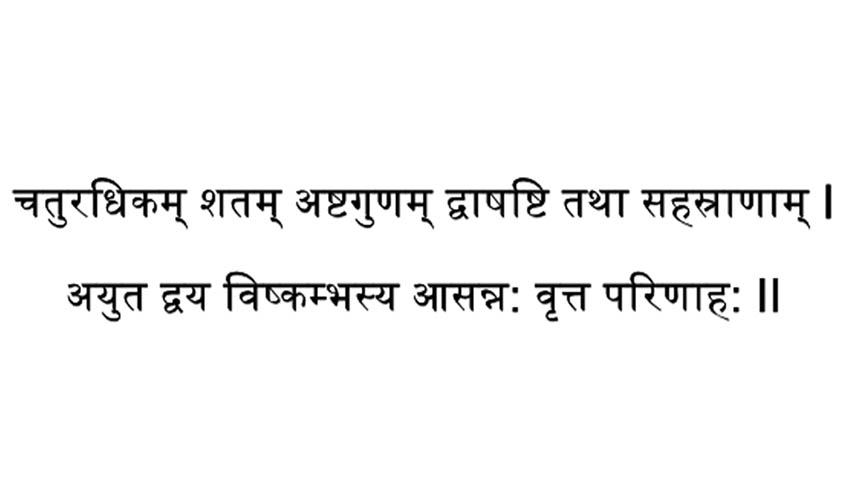What if I told you the illustration given with this piece is not of a spiritual text but the derivation of the mathematical constant, Pi, proposed by India’s renowned mathematician and astronomer Aryabhatta around 500 CE? India has a rich scientific heritage, one that has the potential to open the doors to novel and unconventional ways of understanding the world around us and improving the quality of life. The emphasis on tarka (Sanskrit for logic) based dissemination of education in ancient India ensured constant innovation and a thriving intelligentsia. As early as the Middle Ages, India had mastered her craft in enquiry-driven disciplines like metallurgy, astronomy, astrophysics, mathematics, plant breeding, personalised medicine (i.e., Ayurveda) and surgery.
One of Independent India’s priorities was to cultivate scientific temper. The first Prime Minister of India, Jawaharlal Nehru acknowledged that “science alone can solve the problems of hunger and poverty, of sanitation and illiteracy, of superstition and deadening custom and tradition, of vast resources running to waste, of a rich country inhabited by starving people”. Successive governments have made efforts to accelerate the scientific advancement in India. However, while India is still the home to outstanding talent, the drastic switch to an education system that propagates learning by rote and the lack of sufficient funds and patronage for research and development has limited investment in Indian ways of thinking. As a result, talent in India remains under-tapped. It is common to find young Indians invested in spinning out cost effective imitations of pre-existing innovations from the West, instead of developing novel solutions; an exercise that is colloquially dubbed as jugaad.
On the research front, India has successfully established centres of excellence across the country. However, these are predominantly proponents of Western sciences. Moreover, the vast majority of India’s 700+ universities are better known for their taught courses as opposed to their research programmes. On an average only 4 out of 10,000 people are employed as full time (FT) researchers in India, compared to China, which has 18 FT researches per 10,000 people, and developed nations employing over 80 per 10,000 people (Source: UNESCO & Nature, 2015). Unsurprisingly, India still underperforms in research output at nearly 30% below the world’s average, relative to its gross domestic product (GDP) and population (Source: UNESCO & SCIVAL/SCOPUS). With only 0.9% of the GDP allotted to R&D, India’s innovation sector relies heavily on industry and philanthropies, which again are scarce (Source: DST). As a result, India continues to rely on innovations and ideas developed overseas to tackle challenges at home.
India currently faces three challenges. First, science is thought to have no borders, but in practice it is extremely Eurocentric and dominated by western traditions and experiences. Everything from the technology we use to the medical reference standards on the basis of which patients are treated are driven and influenced by the West. Second, as a consequence of this, native Indian science remains largely unexplored, unacknowledged, undervalued and/or pirated despite the potential for these approaches to address present challenges. Third, the existing education system does not adequately cater to the changing Indian job market, which will replace current menial labour with AI-driven automated processes.
To address these challenges, India needs to adopt a skills based education system, where children are taught to think independently and problem-solve creatively. Incorporating a curriculum that encourages hands-on learning, much like the open source learning that revolutionised the IT sector would be highly beneficial in developing a scientific temper in children. Furthermore, there is a need to encourage entrepreneurship among young people, particularly early-career scientists, but not in a business-sense. Being enterprising does not always involve floating a start-up. An unenterprising scientist usually is not very successful; remaining open-minded towards unconventional sources of knowledge, taking experimental risks and addressing challenges constantly is part and parcel of uncovering cutting-edge innovation. Contrary to popular belief, science is driven by creativity, not routine. In theory, there is a need to combine the age old Indian education system with modern discourse, and draw values from India’s rich science heritage to enable innovation and also rejuvenate indigenous sciences within the accepted framework of modern sciences.
Developing the next generation of free-thinking unbiased scientists is a task India is well placed to achieve. The creation of the Ministry of AYUSH and efforts made to include non-western medical practitioners into the Indian mainstream are some of the laudable recent milestones in bringing Indian sciences to the forefront. Success in this mission will not only demonstrate the role that other indigenous sciences around that world can play, but also deliver a fantastic boost to India’s own development agenda.
Dr Sweta Raghavan is the Senior Science & Innovation Adviser at the Department for Business, Energy and Industrial Strategy’s UK Science & Innovation Networkin India. All views expressed in the article are her own. You can follow her on Twitter @raghavansweta.

